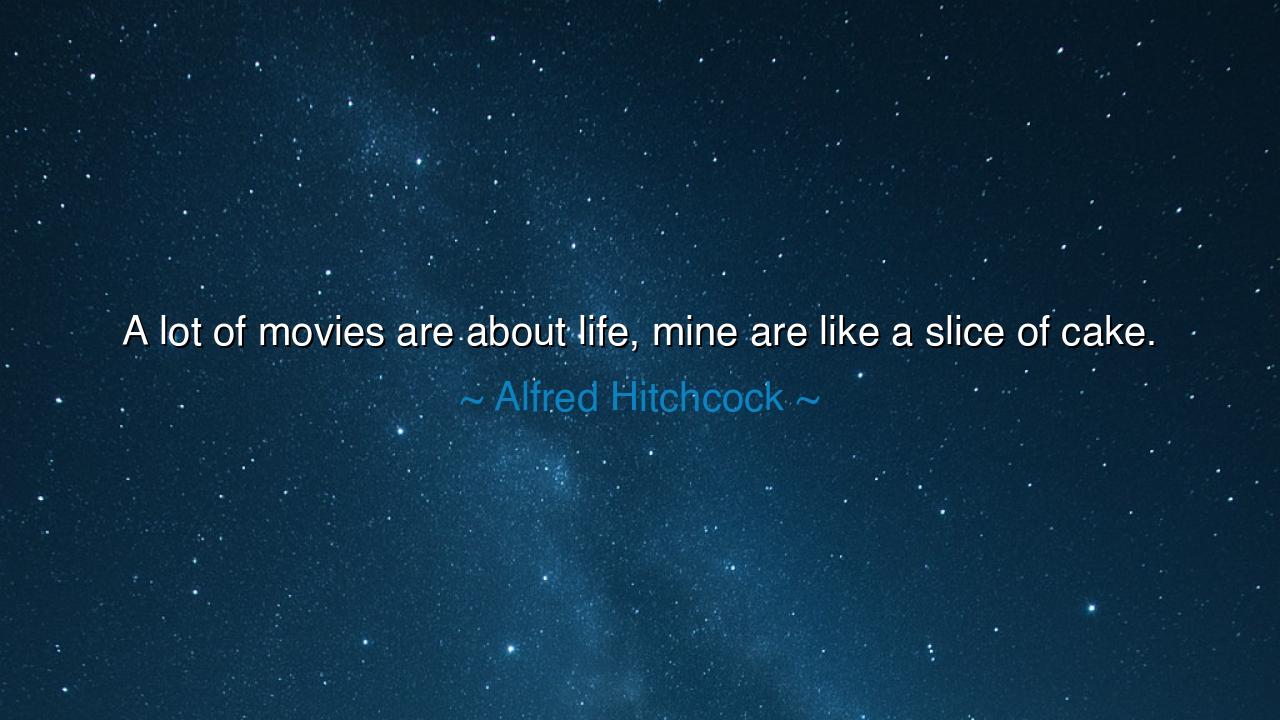
A lot of movies are about life, mine are like a slice of cake.






Alfred Hitchcock, master of suspense and shadow, once uttered these words: “A lot of movies are about life, mine are like a slice of cake.” At first glance, it seems but a light remark, playful and sweet. Yet beneath this jest lies a profound understanding of art and its purpose. Hitchcock knew that while life is vast, filled with burdens, duties, and sorrows, art could carve from it a portion — small, concentrated, delightful — a slice to be savored. He sought not to mirror life in its totality, but to distill it into something sharper, more flavorful, and unforgettable.
The ancients themselves would have understood this metaphor. Did not the poets of old take the endless sprawl of war, love, and grief, and compress them into song? Homer did not recount every day of Troy’s siege, but instead a brief span — a slice — that revealed the essence of glory and wrath. So too, Hitchcock cut from life its most suspenseful moments, its peaks of tension and surprise, and baked them into a form that could be consumed with relish, leaving the soul both startled and satisfied. Just as the sweetness of cake does not nourish the body but delights it, his films did not pretend to instruct in all matters of existence, but to give pleasure, thrill, and escape.
History offers us a parallel in the games of Rome. The people, weighed down by toil, flocked to the Colosseum not for instruction in philosophy, but for spectacle, for that concentrated taste of drama and danger that gave them release. While the philosopher fed the mind, the spectacle fed the heart with excitement. Hitchcock, like the Roman masters of entertainment, knew that humanity craves both: the bread of life, and the cake of art. His genius was to provide the latter so skillfully that it nourished even as it delighted.
Yet there is wisdom here beyond cinema. The quote reminds us that not every act of creation must be heavy with the burden of representing all reality. There is honor, too, in offering joy, in giving the spirit a moment of sweetness amidst the bitterness of days. The laborer who brings laughter to his family, the teacher who tells a story between lessons, the host who offers a song at the table — these also are bakers of cake, makers of delight that lifts the heart and binds the community. Let none despise such things as trivial, for often it is the small sweetness that carries us through the larger struggles.
But Hitchcock also warns, subtly, against excess. A man who dines only on cake grows ill, just as a life lived only in escape becomes hollow. The balance is sacred: life demands both the substance of truth and the sweetness of delight. To seek only the heavy is to crush the spirit; to seek only the sweet is to weaken it. Thus the wise man knows when to labor, and when to feast; when to endure reality, and when to savor a slice of cake carved from it.
Practical wisdom flows from this. In your own life, seek moments of sweetness. Watch a film that thrills you, even if it teaches no philosophy. Share a joke, paint a picture, sing a simple tune. Create not always for grandeur, but sometimes for delight. And when the world weighs heavily upon you, remember that the heart, like the body, needs both bread and cake. Indulge in beauty not as escape from duty, but as fuel to return to it renewed.
So take Hitchcock’s words as both a celebration and a guide. Do not demand of every story that it mirror all of life, nor of every labor that it bear eternal weight. Instead, honor those creations that bring joy, suspense, or wonder, as you would honor a feast after toil. For in the end, though life is long and filled with struggle, it is the slices of cake — the moments of sweetness — that we remember with the deepest gratitude, and that give life its flavor beneath the gaze of eternity.






AAdministratorAdministrator
Welcome, honored guests. Please leave a comment, we will respond soon